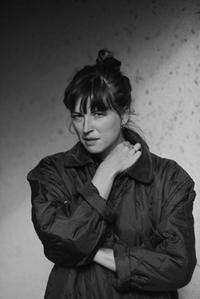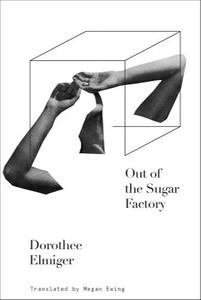
|
|
| photo: Maurice Haas | |
Dorothee Elmiger, a Swiss writer living in New York City, is the author of Shift Sleepers and Invitation to the Bold of Heart. Out of the Sugar Factory, translated from the German by Megan Ewing (Two Lines Press)--part essay, part fiction--is an investigation into the life of a lottery winner, the history of sugar, and strange dreams about food, Marx, and mothers.
On your nightstand now:
I am again reading Claude Lévi-Strauss's Tristes Tropiques after having attempted to read it in French on a journey through France a couple of years ago--only now am I realizing how little I understood then. At the same time, I am reading Werner Herzog's diary Conquest of the Useless, which he wrote between 1979 and 1981 when he was filming Fitzcarraldo. I don't read much that's not related to something I am working on, and this is true for these two books, too.
Favorite book when you were a child:
I learned reading one summer when my dad was driving through Italy with my sister and me, and I read my very first sentences in a so-called Lustiges Taschenbuch, which is what the big Donald Duck and Mickey Mouse comic books are called in German: Funny Pocket Books. I was a comic-book reader first, and I still read them today whenever I can get my hands on one. Those pocket books--the quality of the colors, the feel of the paper--they're really irresistible to me.
Your top five authors:
I am an omnivorous reader, and I'm not so much interested in reading books as single thoughts in competition with each other. Instead, I see books as communicating entities that cannot be understood in isolation. In that sense, I hope to never have a top five authors, but a top million. Some authors I have only recently read for the first time: Ann Quin, the British novelist whose work from the 1960s and '70s has been reprinted in the last years; Gwendoline Riley, an English novelist who wrote My Phantoms and First Love; and the Swedish author Johanne Lykke Holm and her recently translated novel, Strega.
There is one author I do keep returning to again and again, but unfortunately his work is not translated--a German writer called Peter Kurzeck, who wrote many of his books by speaking them on tape, by narrating them, books full of loops and repetitions. They are accounts taken from his own life and, reading them, I often feel a certain longing for the places and people Kurzeck describes, places and people I have never known in real life.
Book you've faked reading:
Infinite Jest. I own many books that I somehow believe to have read just by being in their presence for a long time and by discussing them with my writer friends. Ask me any question about Infinite Jest, and I will answer it.
 Book you're an evangelist for:
Book you're an evangelist for:
Two or three years ago I read Kathryn Yusoff's A Billion Black Anthropocenes or None. She is critical of the universality implied by the term anthropocene and examines geology and geological transformation historically and in the context of race. A small book that I found very illuminating.
Book you've bought for the cover:
Acid Virga by Gabriel Kruis. It's a small book of poetry published by Archway Editions, and the cover is a painting called Golden Showers by Nicole Eisenman. I did read the book and found the writing just as interesting as the cover.
Book that changed your life:
Karl Marx's Capital. It taught me to always ask the question cui bono?--a question that usually proves helpful when trying to figure out what's going on in the world. Aside from his ideas, I enjoy reading him. I find him pretty witty. He was also a great writer of letters, by the way.
Favorite line from a book:
In 1973, Marie Luise Kaschnitz published a book of writings called Orte (Places). Each page contains a different memory connected to a specific geographic place. I was reading it when I was trying to find a way to begin my own book Out of the Sugar Factory, and I instantly recognized a place that I had also been thinking about: an old sanatorium called Bellevue on Lake Constance in Switzerland. Apparently, Kaschnitz had once danced in its garden at night while fireworks rose above her, and a child, the son of the sanatorium's director, "approached a thick tree with two lighted candles and held those little flames to the bark, convinced that he would succeed in making the mighty tree catch fire." I was captivated by this scene, and in a way, Kaschnitz's sentence was the portal through which I was able to enter my own book.
Book you most want to read again for the first time:
W.G. Sebald's The Emigrants. I have read Sebald extensively and have grown rather tired of the coincidences and chance encounters that link the strands and episodes in his books. But it is exactly what I admired when I first read The Emigrants. I have eaten too much of it.
Five books you'll never part with:
Peter Weiss's The Aesthetics of Resistance. Hubert Fichte's Forschungsbericht. Marie Luise Kaschnitz's Orte. Wolfram Lotz's Heilige Schrift I. And Fleur Jaeggy's S.S. Proleterka. These are the books I look to when I am stuck. As a writer, I learn from them stylistically and politically. I find their work so electrifying that I often just need to read a single line in order to feel like everything is charged again and I can't wait to return to my desk.

